
Aug 18
1830 Birth: Franz Joseph: Emperor of Austria (1848-1916) and king of Hungary (1867-1916):
Franz Joseph divided his empire into the Dual Monarchy, in which Austria and Hungary coexisted as equal partners. In 1879 he formed an alliance with Prussian-led Germany, and in 1914 his ultimatum to Serbia led Austria and Germany into World War I. [For further information, click here.]
1890 Birth: Walter Funk: journalist for the Berlin Stock Exchange Journal and Reich economic minister from 1937-1945:

Funk succeeded Hjalmar Schacht as President of the Reichsbank in 1939, and retained this position until the end of the war. Despite poor health, he was tried with other Nazi leaders at the Nuremberg Trials. Accused of conspiracy to commit crimes against peace; planning, initiating, and waging wars of aggression; war-crimes and crimes against humanity, he argued that, despite his titles, he had very little power in the regime. Goering described Funk as "an insignificant subordinate," but documentary evidence and his wartime biography Walther Funk, A Life for Economy were used against him during the trial, leading to his conviction on counts 2, 3 and 4 of the indictment and his sentence of life imprisonment. Funk was held at Spandau Prison along with other senior Nazis. He was released in 1957 due to ill health and died three years later.
1915 World War I: List Regiment:
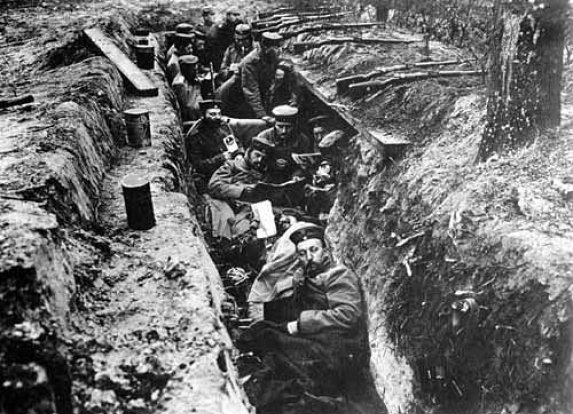
Gefreiter Adolf Hitler's 16 Reserve Infantry Regiment continue to occupy a position at Fromelles, on a level field with water channels, willow trees and willow stalks. In the distance towards the enemy lines lies an insignificant wood with barbed wire entanglements. Under the direction of their defense-minded commander, Lieutenant General Gustav Scanzoni von Lichtenfels, the regiment works ceaselessly day and night to further fortify their position at Fromelles while fighting off repeated assaults by the enemy. [For further details, Click here.]
1914 USA:

President Woodrow Wilson issues his Proclamation of Neutrality, aimed at keeping the United States out of World War I.
1916 World War I: List Regiment:
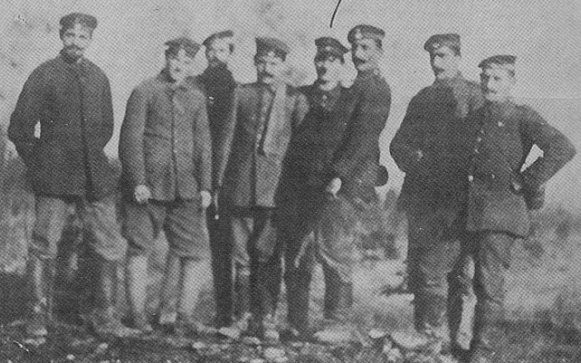
Hitler and his fellow dispatch runners
Gefreiter Adolf Hitler endures trench warfare in Flanders (Artois) with 3 Company, 16 Reserve Infantry Regiment. [For further details, Click here.]
1917 World War I: Various: List Regiment (July 22-September 8):
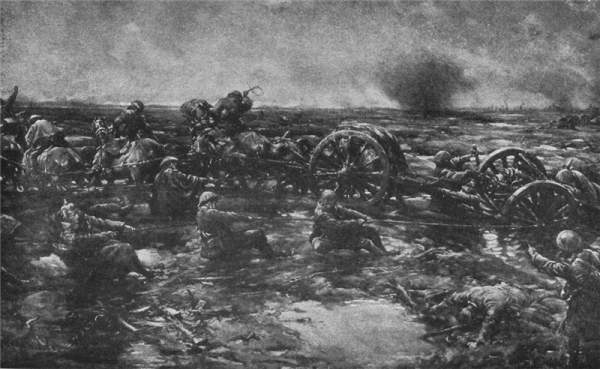
Dispatch Runner Gefreiter Adolf Hitler serves at the front with 3 Company, 16 Bavarian Reserve Infantry Regiment during Phase 2 operations in Flanders. Most of their time in the trenches gas masks are worn, while English bombers attack, and tanks—a new terror witnessed for the very first time by most—attempt to advance over a long front through seas of mud. [For further details, Click here.]
General Luigi Cadorna launches the Eleventh Battle of the Isonzo:
Many began to see little chance of winning the war, as week after week during that summer and autumn more and more Austrian batteries and battalions gave evidence of their arrival from the Russian front. But in spite of all this, the finest effort of the Italian army was made in the last half of August and the first half of September, 1917. It was only after that magnificent and largely successful effort that the fruits of discouragement were reaped in late October. The month of the most continuously fierce fighting in the whole Italian war opened on August 18, 1917, with a general bombardment from Tolmino to the sea. The guns massed along the Corada ridge searched the Austrian positions beyond the Isonzo. Next day, along the front from Plava northwards to Doblar, the infantry bridged and crossed the rapid river in face of the enemy, and began to ascend the eastern bank of the gorge. A more difficult operation, in face of machine-gun posts and a determined foe entrenched in ground of such vantage, has seldom been allotted to any force in the world war.
1918 Various:
Volkishness: A formal dedication of the Germanenorden rooms at the Four Seasons Hotel in Munich is attended by Hermann Pohl, G.W. Freese and a number of other Germanenorden Walvater brothers from Berlin and Leipzig. THP
In the late 19th and early 20th Century, there had been many flourishing esoteric orders in Germany and Austria that sought to establish a reborn Germanic identity and to reconnect the people with their repressed archetypes. One of the most significant of these Orders was founded in Germany in 1912 - the German Order, and from this sprang the Thule Society (Thulegesellschaft). The Thule Society took its name from the fabled land of Ultima Thule, which the Ukrainian witch Madame Helena Petrovna Blavatsky learned of after having been contacted by the Great Race that had survived its destruction.
These ancient, highly intelligent beings worked in concert with certain human adepts--individuals with highly developed occult powers. The truly initiated could, by means of magic-mystical rituals, establish contact with these beings and learn secret arts unknown to the rest of humanity. The [Nazis] believed that with the help of this Great Race they could create a race of Aryan supermen with supernatural strength and energy.
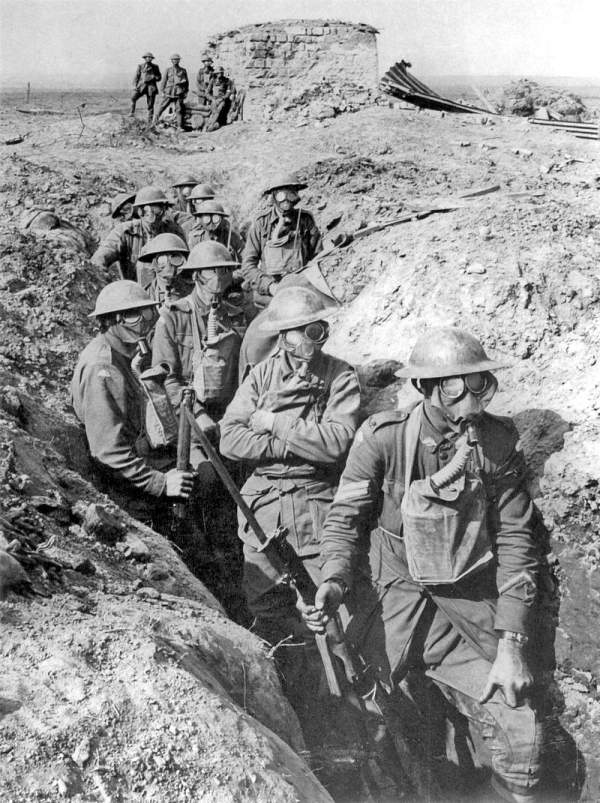
World War I: List Regiment (July 20-August 21): Gefreiter Adolf Hitler's 16th RIR is tasked with building a new line of defenses on the site of the failed Second Battle of the Marne. [For further details, Click here.]
1920 Poland: Pilsudski's Poles complete the defeat of the Soviets in the Battle of Warsaw, also known as the Miracle on the Wisla.
1924 Weimar: French troops begin evacuation of the Ruhr:
Germany had been split into two with contrasting political and economic conditions. In the occupied area the whole of heavy industry lay inert because of passive resistance. But that was quite an extraordinary state of affairs. Workers went on strike but with the consent of their German employers. They were praised as patriots for closing down the mines and steel works and so on. But not only that--they were paid for their time on strike. This was hardly a situation conducive to revolutionary consciousness--to strike and simultaneously to be paid by the bourgeoisie and even hailed as patriots for doing so!
1926 Volkishness: Georg Hauerstein, Jr., son of Georg Hauerstein, a friend of Guido von List and an ONT brother associated with Detlef Schmude before the war, establishes a fund for the purchase of an ancient earthwork called the Hertesburg near Prenow on the Baltic Sea coast. ONT brothers from Hungary and Berlin palmist, Ernst Issberner-Haldane contribute.
Hitler: Why are we trying to bring to the attention of the world the fact that we have no past? Isn't it enough that the Romans built massive buildings, while our forefathers still had to live in miserable huts? Himmler has now started digging up the remains of these miserable dwellings, and is enthralled by every pottery shard or any stone axe he finds. The only thing that comes out of that is, that it is now clear to everyone that we were still throwing stone axes and huddling around the fire at a time when the Greeks and the Romans had for a long [time] reached the highest cultural level. In reality, we should keep quiet about our past, but instead Himmler is creating a quite unnecessary fuss with his activities. The Romans of our days must be highly amused over Himmler's discoveries!
1929 Austria: All Quiet on the Western Front is banned from army libraries: The protagonist of that novel, All Quiet on the Western Front is Paul Baumer, a young German soldier fighting in the trenches of World War I. The story opens in 1917, when half of Baumer's company--many of them schoolmates from back in Germany--has been killed in battle. Over the course of the book, Paul himself is injured and hospitalized, goes home on leave and returns to the front, only to be killed a week or so before the armistice in 1918.
From November 10 to December 9, 1928, All Quiet on the Western Front was published in serial form in Vossische Zeitung magazine. It was released in book form the following year to smashing success, selling a million and a half copies that same year. Although publishers had worried that interest in the Great War had waned more than 10 years after the armistice, Remarque's realistic depiction of trench warfare from the perspective of young soldiers struck a chord with the war's survivors--soldiers and civilians alike--and provoked strong reactions, both positive and negative, around the world. Eventually translated into over 20 languages, the novel was adapted into an acclaimed American film in 1930.
1933 Joseph Goebbels gives a radio speech:
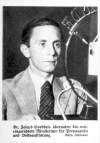
It goes without saying that the National Socialist revolution, which is modern and intent on action, as well as the popular upheaval we have led, must change abstract and lifeless methods in the radio. The old regime was content simply to fill empty offices or change the faces, without however changing the spirit and content of public life. We on the other hand intend a principled transformation in the worldview of our entire society, a revolution of the greatest possible extent that will leave nothing out, changing the life of our nation in every regard.
1935 From US Secretary of State Hull to Ambassador Long in Italy: "You are instructed to seek an interview at the earliest possible moment with Mussolini and to hand him a copy of the following message which I am sending him at the direction of the President":
I am asked by the President to communicate to you, in all friendliness and in confidence, a personal message expressing his earnest hope that the controversy between Italy and Ethiopia will be resolved without resort to armed conflict. In this country it is felt both by the Government and by the people that failure to arrive at a peaceful settlement of the present dispute and a subsequent outbreak of hostilities would be a world calamity the consequences of which would adversely affect the interests of all nations.
1937 Antisemitism: The Romanian Orthodox Church urges the Romanian people to fight the "Jewish parasite." (THP)
1939 Various:
Reich Foreign Minister Joachim von Ribbentrop to German Ambassador in the USSR, Schulenburg:
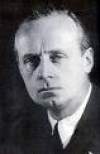
I would ask you to speak with Herr Molotov in the following sense: The Reich Government, to its great satisfaction, has learned from his last statement the favorable attitude of the Soviet Government with regard to the remolding of German-Russian relations. We, too, under normal circumstances, would naturally be ready to pursue a re-alignment of German-Russian relations further through diplomatic channels and to carry it out in the customary way. But the present unusual situation made it necessary, in the opinion of the Fuehrer, to employ a different method which would lead to quick results. German-Polish relations were becoming more acute from day to day. We had to take into account that incidents might occur any day that would make the outbreak of hostilities unavoidable. To judge from the whole attitude of the Polish Government, the developments in this respect by no means rested with us. The Fuehrer considers it necessary that we be not taken by surprise by the outbreak of a German-Polish conflict while we are striving for a clarification of German-Russian relations. He therefore considers a previous clarification necessary, if only to be able to consider Russian interests in case of such a conflict, which would, of course, be difficult without such a clarification.
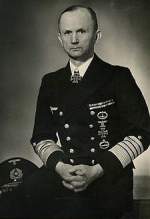
Karl Doenitz dispatches Germany's 35 operational U-boats: 18 are sent to the eastern Atlantic and the remaining 17 to the Baltic for operations against Poland and possibly Russia.
From the opening day of the war until the cessation of hostilities, the Atlantic was a major theatre of operations. Before the Allies could build an army to take back North Africa or the European continent, they had to secure and protect the shipping lanes to England.
At the end of World War I, the Allies decried and outlawed unrestricted submarine warfare at the London Naval Treaty Conference of 1930. Unrestricted submarine warfare was one of the stated causes of American entry into World War I, and the use of submarines was seen as a terror weapon against a civilian population.
At the start of World War II, the Germans had several pocket battleships capable of commerce raiding, converted merchant ships called Q ships for stealthy attacks, and fifty-seven U-boats; only twenty-six were oceangoing U-boats. The early German torpedoes, like the Americans later in the war, suffered from faulty torpedoes that broke up upon impact instead of detonating. Kontradmiral Karl Doenitz had commanded the first U-boat group in 1936, and had risen to command all the U-boats by the start of the war. Unlike the Americans, he quickly moved to fix the torpedo problem.
Countdown to war:
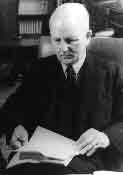
Weizsaecker repeats his warning to the British and French Ambassadors. (THP) See August 15)
After learning a German attack on Poland is threatened to take place within two weeks, Sir Neville Henderson, the British Ambassador in Berlin, implores Chamberlain to write personally to Hitler.
1940 World War II: Hitler tells Vidkun Quisling: "I now find myself forced against my will to fight this war against Britain. I find myself in the same position as Martin Luther, who had just as little desire to fight Rome but was left with no alternative." (THP)
1941 World War II: Various: USA:
Barbarossa: German troops under von Leeb surround Leningrad in the north:
The Germans, flushed with the initial success of 'Barbarossa', decided that they would not storm the city. Hitler had stated to his generals that once Leningrad had been surrounded and bombarded from the air and by artillery on the ground, the resolve of the city to continue the fight would disappear. German bombers also dropped propaganda leaflets on the city, claiming that the population would starve to death if they did not surrender.
Euthanasia: Due to protests, Hitler orders a temporary halt (to take effect on Aug 24) in Nazi Germany's systematic euthanasia of mentally ill and handicapped. "Between December 1939 and August 1941, about 50,000 to 60,000 German children and adults were secretly killed by lethal injections or in gassing installations designed to look like shower stalls. It was a foretaste of Auschwitz." (Never to Forget, New York: HarperCollins, 1976:131.)
1942 World War II: Various: From a discussion between Fritz Sauckel and Hans Frank at Krakow:
Frank: I am pleased to report to you officially, Party Comrade Sauckel, that we have up to now supplied 800,000 workers for the Reich . . . Recently you have requested us to supply a further 140,000. I have pleasure in informing you officially that in accordance with our agreement of yesterday, 60 percent of the newly requested workers will be supplied to the Reich by the end of October and the balance of 40 percent by the end of the year. Beyond the present figure of 140,000 you can, however, next year reckon upon a higher number of workers from the Government General, for we shall employ the Police to conscript them.
Church and Reich: Colonel Kurt Gerstein, who later claims to have joined the SS to investigate the stories of extermination for himself, tries to tell the Papal Nuncio in Berlin about a gassing he had recently witnessed near Lublin (see August 17). Monsignor Orsenigo refuses to see him so he tells his story to Dr. Winter, the legal advisor of Bishop Preysing of Berlin and a number of others. He also requests that the report be forwarded to the Holy See.
1943 Various: World War II: From a letter sent by the Commander-in-Chief of the Air Force to the Supreme Command of the Wehrmacht:
The Commander-in-Chief, Air General Staff, proposes to erect prisoner-of-war camps in the residential quarters of cities, in order to obtain a certain protection thereby . . . . In view of the above reason, consideration should be given to the immediate erection of such camps in a large number of cities which appear to be endangered by air attacks. As the discussions with the city of Frankfurt . . . have shown, the towns will support and speed up the construction of the camps by all available means . . . . So far, there are in Germany about 8,000 prisoners of war of the British and American Air Forces (without counting those in hospitals). By evacuating the camps actually in existence, which might be used to house bombed-out people, we should immediately have at our disposal prisoners of war for a fairly large number of such camps.
Holocaust: Various: Sobibor: Members of the corpse-burning squad dig a tunnel, but come out in the minefield. All 150 members of the squad are executed. (THP)
German SS and Police officials deported Jews to Sobibor primarily from the ghettos of the northern and eastern regions of Lublin District in the Government General. The Germans also deported Jews to Sobibor from German-occupied Soviet territory, Germany itself, Austria, Slovakia, Bohemia and Moravia, the Netherlands, and France. In all, the Germans and their auxiliaries killed at least 167,000 people at Sobibor. Sobered by both the sense that killing operations in the facility were winding down and information that Belzec had been dismantled and all surviving prisoners liquidated, prisoners at Sobibor organized a resistance group.
Research: The DFG (the German Association for Scientific Research) approves Professor von Verschuer's application for a grant for the study of "specific proteins."
Holland: More than 2,000 Jews are deported to Auschwitz.
Poland: Slave labor camps in the General Government are 'liquidated,' and their inmates murdered. (THP)
1944 World War II: Various: The Red Army recaptures Sandomir in Galicia:
Large German counterattacks were launched in an attempt to throw the Soviets back across the Vistula. Using the towns of Mielec and Tarnobrzeg on the eastern bank of the river as bases, these attacks caused heavy casualties to the Soviet forces. By mid August, Konev's spearhead, the 6th Guards Tank Corps had only 67 tanks remaining. The Germans launched a fierce counterattack with Schwere Panzer Abteilung 501 and 16.Panzer-Division, totaling around 140 tanks including 20 Tiger IIs. Despite being outnumbered, the 6th Guards held the bridgehead, knocking out 10 Tiger IIs. By 16 August, the German counterattacks were beginning to lose steam, and Rybalko, commander of the Bridgehead, was able to expand the Soviet controlled area by a depth of 120 kilometers, capturing the city of Sandomierz. Both sides exhausted, the fighting died down and the Soviet Offensive was deemed completed.
The Warsaw Uprising: Last execution of Poles at Pawiak by Nazis. (THP)
On the fifth day of the Uprising, captain Jan announced a new objective for the company: to take the concentration camp Gesiowka, erected by the Germans in the vast, empty and wide open space of the burned out Warsaw Ghetto. The name of this labor and annihilation camp stems from the same of the Gesia street, which was parallel to a nearby street, Pawia, on which stood the infamous prison Pawiak, in which the Germans incarcerated Poles for their patriotic stand.
Churchill to Eden: I have seen the extremely lukewarm telegram of August 15 from the American Joint Chiefs of Staff to General Eisenhower . . . . The air authorities out here assured me that the Americans wished to send help from England to Warsaw, and that the operation was quite practicable, providing of course that the Russians gave their consent. It seems hardly credible to me that the request for landing facilities would have been submitted to the Russians unless the practicability of the operation had been examined by General Dolittle. It is most important that you should find out if it is practicable or not. Before the President, or I, or both, make any personal or joint appeals to Stalin it is of course necessary that the military difficulties should be resolved.
Churchill to FDR: An episode of profound gravity is created by the Russian refusal to permit American aircraft to bring succor to the heroic insurgents in Warsaw, aggravated by their own complete neglect to provide supplies by air when only a few score of miles away. If, as is almost certain, a wholesale massacre follows the German triumph in that capital no measure can be put upon the full consequences that will arise. 2. I am prepared to send a personal message to Stalin if you think this wise, and if you will yourself send a separate similar message. Better far than two separate messages would be a joint message signed by us both. 3. The glorious and gigantic victories being achieved in France by the United States and British forces are vastly changing the situation in Europe, and it may well be that the victory gained by our armies in Normandy will eclipse in magnitude anything that the Russians have achieved on any particular occasion. I feel therefore that they will have some respect for what we say so long as it is expressed plainly and simply. We are nations serving high causes and must give true counsels towards world peace even at the risk of Stalin resenting it. Quite possibly he wouldn't.
Death: Field Marshal Gunther von Kluge—one day after being relieved of command of the Western Front. He was recalled to Berlin for a meeting with Hitler after Stauffenberg's failed coup; thinking that Hitler would punish him as a conspirator, he committed suicide by taking cyanide on the plane to Berlin. He left Hitler a letter in which he advised Hitler to make peace and "put an end to a hopeless struggle when necessary . . . . " Hitler reportedly handed the letter to Alfred Jodl and commented that "There are strong reasons to suspect that had not Kluge committed suicide he would have been arrested anyway."
Edited by Levi Bookin (Copy editor) Click to join 3rdReichStudies Disclaimer: This site includes diverse and controversial materials--such as excerpts from the writings of racists and anti-Semites--so that its readers can learn the nature and extent of hate and anti-Semitic discourse. It is our sincere belief that only the informed citizen can prevail over the ignorance of Racialist "thought." Far from approving these writings, this site condemns racism in all of its forms and manifestations. 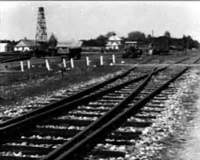
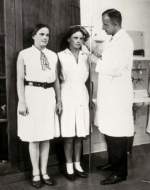
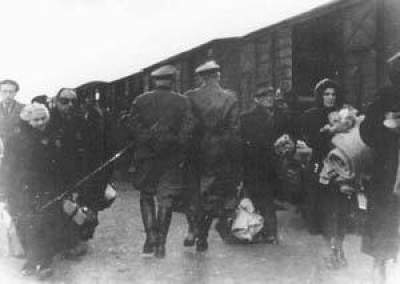

levi.bookin@gmail.com










Fair Use Notice: This site may contain copyrighted material the use of which has not always been specifically authorized by the copyright owner. We are making such material available in our efforts to advance understanding of historical, political, human rights, economic, democracy, scientific, environmental, and social justice issues, etc. We believe this constitutes a "fair use" of any such copyrighted material as provided for in section 107 of the US Copyright Law. In accordance with Title 17 U.S.C. Section 107, the material on this site is distributed without profit to those who have expressed a prior interest in receiving the included information for research and educational purposes. If you wish to use copyrighted material from this site for purposes of your own that go beyond 'fair use', you must obtain permission from the copyright owner.
Please Note: The list-owner and moderators of 3rdReichStudies are not responsible for, and do not necessarily approve of, the random ads placed on our pages by our web server. They are, unfortunately, the price one pays for a 'free' website.



